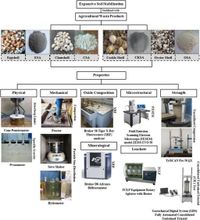Researchers have found that using agricultural waste ashes such as eggshell, clamshell, cockle shell, and oyster shell ash can significantly stabilize expansive clay soils, thereby reducing their problematic swelling and shrinkage behaviors that often affect construction projects.
The study reveals that the inclusion of these ashes reduced the plasticity of expansive clay soils from 29.6% down to 7.84%, increased the shrinkage limit from 15.55% to 33.06%, and importantly improved the unconfined compressive strength (UCS) from 114.64 kPa to 1509.95 kPa. This dramatic transformation highlights the potential for repurposing agricultural waste to improve soil properties sustainably.
Conducted by a team of researchers in Malaysia, this study aligns with the goals of the United Nations' Sustainable Development Goals, particularly in fostering responsible consumption and production, and supporting sustainable cities and communities.
Expansive soils are notoriously difficult to work with in civil engineering due to their tendencies to swell or shrink with water content variations, which can lead to structural damage and costly repairs. The annual economic impact of this issue runs into the billions globally, underscoring the need for effective soil stabilization methods to ensure the safety and longevity of infrastructure.
Traditionally, chemical additives like lime and cement have been employed for such purposes but come with significant environmental costs due to high carbon emissions during production. The use of agricultural residues offers an eco-friendly alternative that not only mitigates waste but also enhances soil resilience.
The researchers undertook extensive laboratory experiments to assess the properties of the expansive clay when treated with different types of shell ashes. The findings indicated that the use of these materials not only improved the strength and stability of the soils but also contributed to a more environmentally friendly approach to construction practices.
"This research supports the concept of a circular economy, transforming waste materials into valuable resources," stated the authors of the article. The cultivation of resilient infrastructure through the use of local agricultural byproducts can revolutionize geotechnical engineering, particularly in regions grappling with expansive soils.
Moreover, microstructural analyses conducted during the study revealed the formation of cementitious compounds that were responsible for the observable improvements in soil characteristics. By incorporating eggshell ash, clamshell ash, cockle shell ash, and oyster shell ash, the researchers successfully reduced the susceptibility of the clay to moisture-related issues, strengthening its overall load-bearing capacity.
In addition to enhancing the physical and mechanical properties of soils, this study reinforces the importance of integrating sustainable practices into engineering disciplines. With soaring construction costs and increasing focus on environmental stewardship, the findings pave the way for diverse applications of agricultural waste in soil stabilization and broader infrastructure development.
As construction practices continue to evolve, the potential for agricultural waste materials to play a substantial role in mitigating the socio-economic burdens of expansive soils builds a strong case for ongoing research and implementation of these findings in civil engineering practices worldwide.
Future research is encouraged to explore combinations of different agricultural waste materials and the synergistic effects they may provide, as well as pilot studies to evaluate their performance on full-scale construction projects.

